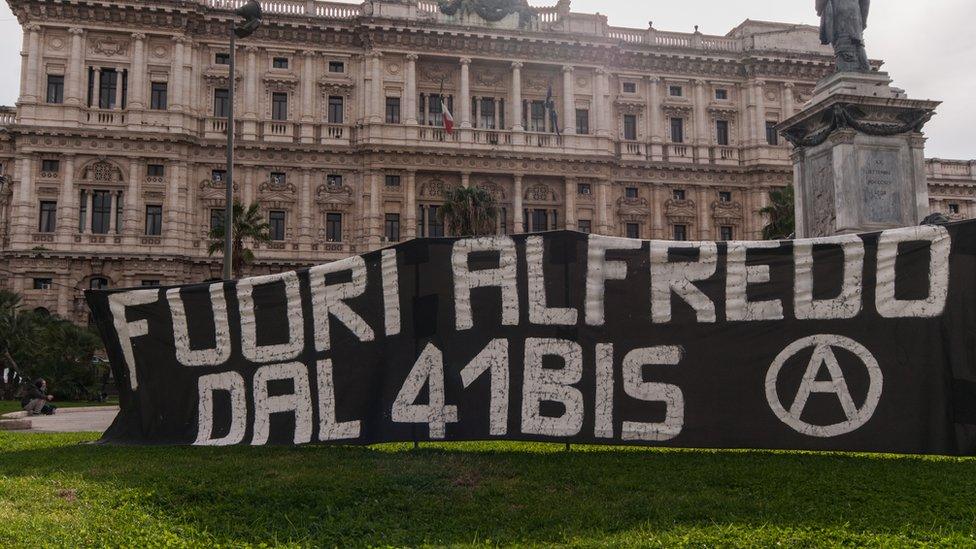Alfredo Cospito: Hunger-striking Italian anarchist moved amid protests
- Published

Supporters have been protesting against Cospito's incarceration conditions for weeks
A convicted Italian anarchist who has been on hunger strike for weeks has been moved to a jail in Milan amid growing fears his health is worsening.
Supporters of Alfredo Cospito, 55, have torched cars and threatened officials in protest at his jail conditions.
Cospito has been refusing food for more than 100 days.
The new restrictions, usually reserved for mafia bosses, include one monitored visit from family members and one telephone call a month.
The measures, known as 41bis after an article of the Italian criminal code, were introduced in their current form in 1992, after the mafia killings of judges Giovanni Falcone and Paolo Borsellino, and were originally meant to cut off Mafia bosses from the outside world and other inmates, and to prevent them from ordering criminal acts from behind bars.
Now, however, the 41bis prison regime can be imparted on people who have been found guilty of crimes ranging from terrorism to tobacco smuggling and kidnapping.
Critics of the 41bis - including former prisoners who experienced it - say that the solitude faced by those who live through it is "unbearable" and that cells are barely big enough for a bed.
Aside from only receiving one monitored visit from family members a month, prisoners are also banned from interacting with other prisoners or meeting with third parties, have to spend their one recess hour a day in isolation, have no access to the prison's communal areas and are kept under 24/7 surveillance.
Some legal experts have said that the 41bis is "a medieval form of punishment".
The lawyers for far-left terrorist Nadia Lioce, who has been living under the 41bis regime for two decades, have said that because of the severe limitations on the number of hours she can see her family or legal team she has effectively only interacted with people for a total of 15 hours in the space of a year.
Italian media reported Lioce's lawyers as saying she is now so "psychologically isolated" that, when her mother and sister visit, she is unable to speak to them for more than a few minutes.
Amnesty International and the European Court of Human Rights have both criticised several aspects of the 41bis, and in 2007 a US court refused to extradite a convicted Mafia drug trafficker on the grounds that the 41bis regime he would face in Italy would have "constituted torture".
Cospito is serving two jail sentences - 10 years for a gun attack on the CEO of a nuclear engineering company in Genoa in 2012 and 20 years in prison for bomb attacks against a Carabinieri police school in Fossano, masterminded whilst in prison. His partner is also serving time.
He was moved on Monday from a prison in Sardinia to Milan's Opera prison - a facility for inmates who need critical medical care. He has lost more than 40kg (6.2 stone) during the course of his hunger strike but the government has refused to lift the terms of his imprisonment.
Italian Prime Minister Giorgia Meloni has said her government will not be intimidated by the threats of violence.
Justice Minister Carlo Nordio said on Tuesday that the wave of violence and vandalism in recent days proved a link continued to exist between Cospito and other anarchists and "that would tend to justify maintaining the 41bis".
Protests against his incarceration have included attacks against Italian diplomats in Germany, Spain and Greece as well as in South America. Threatening letters containing bullets have been sent to officials.
In the most serious attack, the car of senior diplomat Susanna Schlein was destroyed by a petrol bomb in Athens in early December.
Several cars were set alight in Rome and Milan in further incidents on Monday night.
Cospito's case is due to be heard by Italy's highest court in March.